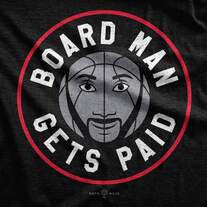 And when we thought it couldn't get any more surreal, The Athletic ran a story of what Kawhi was like in college at San Diego State. For one of the greatest players of his generation, his trash talk game was a bit odd. Rarely letting anyone score on him, when getting a rebound he'd say "Board man gets paid." When he explained the origin of that, it gave a glimpse into the psyche of a player who has a reputation for being intensely personal and a bit of a cyborg. The takeaway? If we want to pursue excellence, to pursue effective ministry, we have to be willing to do the little things. Getting rebounds, for Kawhi, is a way that he can strengthen his team and increase his effectiveness on defense. It's also a reminder to everyone else on the team that since the star is willing to out-work, out-hustle, and out-compete, everyone on the roster should as well. We do this when we adopt an attitude of whatever it takes. Never should we in leadership expect other people to do what we aren't willing to ourselves. It also means that we embrace passivity because "it's not my job." We should and ought to delegate, but we also have to remember that sometimes fulfilling our calling will involve unclogging a toilet. We do this when we seek excellence in the little things. It's not usually in the big things that our focus is found, it's in the little things. When our services are filled with typos, glitches, our messages aren't crisp in their transitions, and we ask people to fill out cards that aren't where they should be, we're communicating a message of carelessness. It doesn't mean micromanaging, but it does mean ensuring that whatever we do, we're doing it with excellence. We do this when we defer credit. The board man does the dirty work to clear the rebound and turn the ball up court. Usually the one clearing the rebound will be the last one in the offensive set. Deferring credit means that we're willing to let other people get the applause. As leaders, we're not doing what we do so we can get a pat on the back. We're willing to give credit to others, to lift up those around us. We do this when we grind. Faithful ministry is less about stellar preaching and really slick video promotions. It's more about plodding. What separates basketball players with potential and those who succeed isn't talent, it's grind. When we're willing to put in the time, to work hard, to dig deep in people's lives, and to do the hard work, we're going to see fruit. We're going to see the work finished that God has started in our lives and others'.
0 Comments
Leave a Reply. |
Scott M. DouglasA blog about leadership and the lasting legacy of family ministry. Archives
August 2023
Categories
All
|
 RSS Feed
RSS Feed



